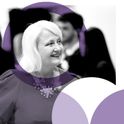At the height of her desperate search for a cure, Jacqueline Alnes became obsessed with a diet that involved surviving on a handful of raw fruits and vegetables each day. In 2013, she was “lured in” by a fruitarian movement called “30 Bananas a Day”. Its many thousands of followers claimed that eating a mono-diet of the potassium-rich fruit could miraculously heal chronic health issues such as depression, addiction and cancer.
“Some were peaceful, care-about-the-earth types who were drawn to the extreme of eating 30 bananas a day because it was environmentally friendly and cruelty-free,” Alnes tells me over Zoom from her Pennsylvania home. “But many were women in their teens or early twenties who had struggled with disordered eating. Like me, they were at very vulnerable stages of their lives.” Alnes, a journalist, has now authored a tell-all book about her fruitarian experience called The Fruit Cure: The Story of Extreme Wellness Turned Sour.
Alnes’s family moved every two years during her childhood—which was “difficult, as an introvert.” While living in Indonesia, she fell in love with running. Where she lived, “there were these family 5K runs… I’d take part with my brother; we were obsessed with Lord of The Rings, so we’d pretend we were running away from the orcs.” In her freshman year of college in the US, she was picked as a Division One runner, but her season was cut short by inexplicable neurological symptoms. “There’s a culture in athletic programs that you just ‘push through’ the pain.” Fainting episodes intensified, though, leaving her using a wheelchair and experiencing episodes where she was unable to walk or speak.
Alnes was admitted to an epilepsy centre, but doctors couldn’t explain her symptoms. She turned to Google, and came across the 30 Bananas a Day website. “At first, I thought it was hilarious. The website had a very 1990s vibe to it—cartoon vegans lifting bananas with electronic music pumping in the background.” The testimonies piqued her curiosity. “I found people who had similar health issues to me—and they’d recovered by simply eating fruit! I clung on to the idea that if I could change what I was putting in my body, I could find a way to heal myself.”
The “30BAD” movement, also called “Banana Island”, started in Japan in 2008 but was popularised in the west by Leanne Ratcliffe and Harley Johnstone, two Australians who went by the monikers “Freelee the Banana Girl” and “Durianrider”. In the 2010s, the duo posted popular clickbait-style YouTube videos about how fruit had cured them.
This was a media landscape where being thin was everything
Alnes traces the concept of fruitarianism back to the 1800s, when it was linked to Christianity, but she believes social media reignited its appeal. “This was a time before body positivity, before we had the knowledge to debunk bogus health claims and the controls in place to recognise and ban pro-eating disorder content online,” says Alnes. “It was also a media landscape where being thin was everything.” It took her “five or six years” plus “lots of therapy” to untangle her disordered thoughts about food.
“For me, the end came in 2016, when Freelee and Durianrider started eating boiled potatoes,” she recalls. “They launched a new diet, called ‘RawTil4’, which said you could eat cooked food after 4pm.” The “strict guidelines” she’d “used to control her body” started to blur. “If the leaders of this restrictive community could eat at a mall food court, then what was stopping me from eating things that made me feel good?” The movement broke down the same year, as did the couple, whose split spiralled into accusations of domestic violence and competing legal claims.
Alnes believes that if fruitarianism has lost its mainstream appeal, it’s only been replaced by other restrictive forms of eating. “Right now, my Instagram Explore page is full of people following the carnivore diet [eating animal products only] and the raw milk diet [drinking unpasteurised milk directly from cows]… There will always be this sense that if you keep your body pure from evil things, you can somehow spare yourself from the many sad and distressing possibilities that might happen to your body. Rules give us the illusion that we have control.”
Correction: An earlier version of this piece stated that for a time Jacqueline Alnes only ate raw fruit and vegetables, and that she became unable to walk or speak. Although she was obsessed with the fruitarian diet, she never gave up cooked food entirely, and experienced episodes of being unable to walk or speak. It also incorrectly stated that she used to live in a village. The piece has been amended to reflect these points.













